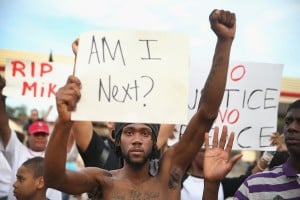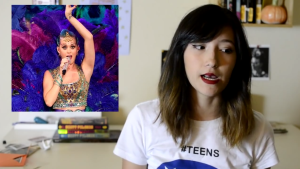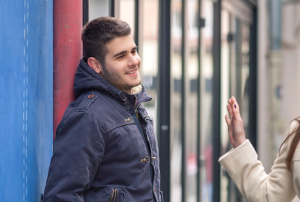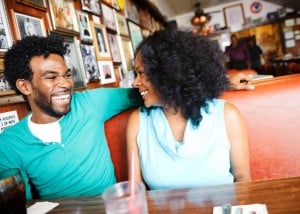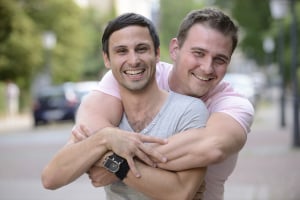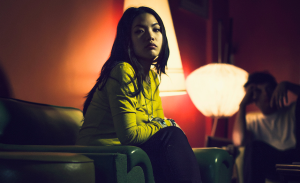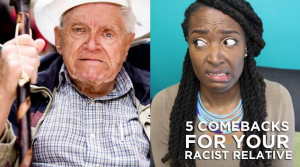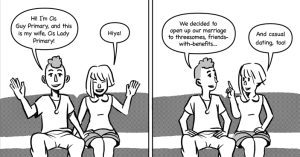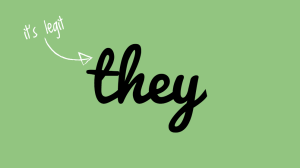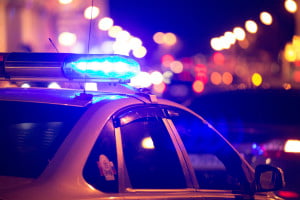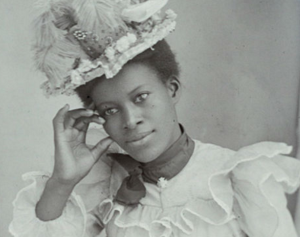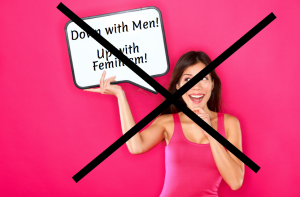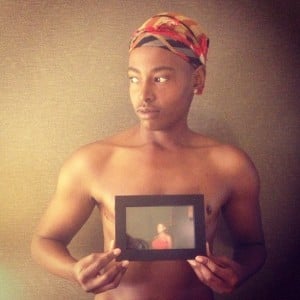Something’s very wrong with the glaring disconnect between those of us who support the Black Lives Matter protests against police brutality and those who criticize them.
And I’m having a hard time grasping how there is such a vast difference in perception.
We’re living in the same country, but some of us are losing our lives, our family members, our loved ones, and our sense of peace and safety to police violence. Others seem to think that those of us being slaughtered are the problem, that the police are doing a fine job.
From where I’m standing as a Black woman, this is terrifying. Because people in my community are reacting to a threat that haunts our lives every day.
We’re reacting to a force that has already taken more than 255 of our lives in 2015 by mid-April 2015.
We’re acting on what we know unequivocally to be true: the law enforcement systems authorized to protect us are using deadly force against us instead.
So if anyone thinks that the protests calling attention to these harrowing conditions are uncalled for, then the facts of the reality I’m witnessing must be missing or mischaracterized. The more people believe in misinformation and criticize the rise of vital voices, the more progress slows in the dismantling of the systems killing us.
As progress slows, people die.
Many of you who are against the Black Lives Matter movement, and other anti-police violence protests, like to begin explaining your dissent by saying, “I respect the right to protest, but…”
And I want to interrupt you right there.
That respect makes sense – protests over injustice in the United States are nothing new.
Without them there would be no United States of America. We hail the dissidents of the American Revolution as our nation’s founding heroes, celebrate them every 4th of July, document and applaud their uprising in our history books.
What our history lessons fail to mention is the fact that for people of color, surviving in this country has required fighting against oppression, every day of our lives – through the colonization of Indigenous lands, slavery, Jim Crow, the mass incarceration of Black and Latinx folks, and more – not just during Martin Luther King, Jr’s “I Have a Dream” speech.
These battles are an undeniable part of our legacy, and something that must continue in order to shake off the lasting impact of centuries of oppression. We continue to fight for safe housing, employment, positive representation, and more of the basic needs required to live with dignity.
The marches taking place today, in response to police brutality and under the banner of Black Lives Matter, may have a new slogan, but they’re addressing the same root causes of injustice that have plagued our nation since its beginning.
The struggle for so many of our dissenters may be that this energy, this commitment to something better, this unrest, this determination to speak up and out is new to many of us alive today. These protests are establishing a cultural precedent we’re not used to.
Not long ago, I wouldn’t have even heard the names of many unarmed Black people killed by police. Now, when a name like Eric Garner or Freddie Gray reaches the media, I hear their names repeated, see them written on banners, watch them move down city streets and up freeway exits.
It’s no longer business as usual as far as police brutality is concerned.
In spite of the alarming need to disrupt this violent system, some see this disruption as a bad thing. There are many common complaints about the Black Lives Matter protests, and Nick Wing has translated them into the discompassionate dismissals they sound like to those of us who care about this movement.
The protests will continue, and as such, I’m sure the objections will keep coming up, too. So before the next demonstration halts traffic and ruffles feathers, let’s look at what people are missing when they voice these objections.
1. You say: “These protests are just disrupting people’s lives. They’re not doing anything to help the cause.”
You cite moments like freeway shut downs and Black Brunch, to say that these protests are pointless at best, and destructive at worst.
Here’s what you’re missing.
Our lives are already disrupted. To you, an uninterrupted commute home from work may feel like everything is all good and peaceful.
But in that moment, as you head home, someone is grieving for their child who didn’t attend work or school that day because they were killed by police. Someone is fearing for their life because a law enforcement officer has profiled and stopped them. Someone in need of protection is more afraid of police than of the person they need protection from.
This issue needs immediate attention. We’re losing our lives.
Helping people wake up to that reality is part of the whole point of civil disobedience, a tactic used to call for justice when we’re facing unjust systems that hold far more power than a carefully worded letter could ever challenge.
Disrupting business as usual is part of the point, too. Because allowing business to continue as usual means maintaining the status quo that’s killing us.
2. You say: “I support peaceful protests, but the rioting is too much.”
You look at the “looting,” the destruction, the rage, and you think about how, regardless of the cause, creating that damage is wrong.
Here’s what you’re missing.
We’re angry. There’s no reason to apologize for that.
Michael Brown’s family shouldn’t be obligated to temper their rage over the loss of their son’s life. People who live in communities struck by fear of law enforcement shouldn’t be expected to find a polite way to bring their concerns to the very people responsible for upholding the lethal institutions they fear. Protesters shouldn’t have to apologize for taking to the streets when their concerns go unheard in the courts.
As for the destruction of property, I shouldn’t have to say this, but it doesn’t compare to the value of our lives.
I do understand the concerns about it, and if you’re looking for a reiteration that protesters don’t condone the damage, you can find it repeated many times. There are plenty of people doing the work of distancing the protests from unlawful behavior.
Perhaps the same strong feelings were the catalyst for both peaceful protests and unlawful behavior, and for that reason, you have a hard time separating the two. You can’t be blamed if the media chooses to frame the events that way, to simply show you images of “riots” without a full analysis of why they’re unfolding as they are, in frustrated communities plagued by poverty and dehumanizing experiences of racial profiling.
But you can look beyond the mainstream media narrative to consider what it’s missing.
It’s true that destructive behavior can come out of strong feelings. For other examples, see emotional responses to sports events.
So when 10,000 people march peacefully in Baltimore and the media focuses on “riots,” while white people can get a pass for rioting over pumpkins, we can see that the focus on unlawful acts is a distraction from the very real need for change.
3. You say: “Protesters should go through the appropriate channels if they want to change something.”
Why take to the streets, instead of going to City Hall or the voting booth?
Here’s what you’re missing.
You know that whole system of government that’s supposed to represent us, look out for our needs, and create and enforce laws to protect us? Yeah, that’s the very system that’s causing our problems.
These protests are a reaction to the fact that those so-called “appropriate channels” don’t look out for us – in fact, they cause us harm every day.
After all, who are you supposed to call in the case of violence against yourself or your loved ones? The police. And if the police are the ones committing violence against you? Far too many go without seeing justice when that’s the case.
The shooting of Walter Scott was a chilling example of what it means to rely on law enforcement systems to uphold justice. Consider the accounts of his killing that came out before and after a video tape emerged of police officer Michael Slager shooting him in the back as he fled. The vast difference between the two accounts should be enough to make us all question what really happened each time the word of a police officer was weighed against the silence of someone they killed.
So while we march under banners of justice for the lives we mourn, we would have no hope for change if we fought for one victim at a time. Instead, we’re both grieving for the victims and calling attention to the need to address the root causes of the violence that’s taken away their lives.
That kind of change can’t come quietly.
4. You say: “Protesters are fighting for the wrong victims.”
You wonder why they don’t protest over “Black-on-Black crime,” or consider that some of the people they’re sticking up for are “criminals” or “thugs.”
Here’s what you’re missing.
Violent crimes among African-Americans are no different from violent crimes in groups of other races – the majority of victims and offenders of violent crimes are of the same racial background or they know each other.
As Elon James pointed out, so-called “Black-on-Black crime” is already being addressed in our communities, so the narrative that Black people aren’t concerned about it is a false one, and a deflection from the issue of police violence.
The fact is that police brutality is a vastly different issue. Police officers are sworn to protect us, and if they’re incapable of doing that without killing us – or they’re more likely to kill people of color when they do – that’s a huge problem.
It’s still a problem even if the media can find a mug shut of the victim to show when they discuss their murder. It’s still a problem even if the person killed is someone who is described by the New York Times, as Michael Brown was, as “no angel.”
Of course, many of us are less likely to notice it’s a problem if that’s the case. What’s going to evoke more empathy: a story about someone who’s struggled through the devastating effects of poverty their entire life, only to be profiled as a bad person for the way he looks and criminalized for the desperate measures he takes to survive, then ruthlessly gunned down and demonized even after his death? Or one about a subhuman “thug” whose own actions led to his murder?
Without empathy and compassion for the victims, we allow these lethal systems to continue to kill.
The truth is that it wouldn’t matter if Michael Brown was some kind of angel. If you’re looking for a purely innocent victim, look at Aiyana Stanley-Jones, the 7 year old girl who was sleeping on a couch when police entered the wrong house and shot her in the head. Joseph Weekley, the police officer who killed her, had all charges against him dismissed.
If we stand up only for the “perfect victim,” we may still never see justice. And we will still be vulnerable to getting caught in a perfectly human moment in which we’re the ones in a crowd of “loud” people, as Rekia Boyd was, or wearing sagging pants, like Ervin Leon Edwards was, or fleeing for our lives, and our violent death will be said to be justified.
***
Business as usual looks like uninterrupted brunches, commutes, and murder.
Please excuse the inconvenience as we fight to stay alive.
[do_widget id=”text-101″]
Maisha Z. Johnson is the Digital Content Associate and Staff Writer of Everyday Feminism. You can find her writing at the intersections and shamelessly indulging in her obsession with pop culture around the web. Maisha’s past work includes Community United Against Violence (CUAV), the nation’s oldest LGBTQ anti-violence organization, and Fired Up!, a program of California Coalition for Women Prisoners. Through her own project, Inkblot Arts, Maisha taps into the creative arts and digital media to amplify the voices of those often silenced. Like her on Facebook or follow her on Twitter @mzjwords.
Search our 3000+ articles!
Read our articles about:
Our online racial justice training
Used by hundreds of universities, non-profits, and businesses.
Click to learn more


